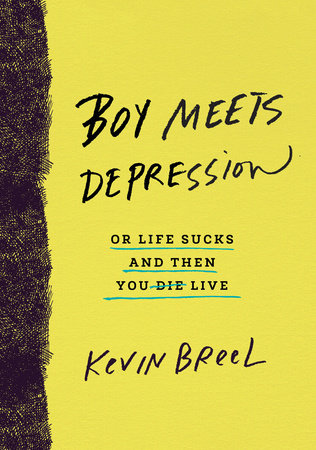1
The Little House on Hobbs Street
Recently, I found out I had colic as a baby. I don't know exactly what this means other than that my mum says it made me cry a lot and I was fairly unbearable. She said one time she had me in a stroller and an older woman from the neighborhood asked if she could peek inside to see me. When she did, I erupted with noises so vile, I almost gave the poor lady a heart attack. So I came into the world kicking, screaming, and crying. And maybe not much has changed since.
I was a bit of an explosion of a child. Small, with slender shoulders and legs that seemed skinnier than my wrists. My hair was long and moplike, usually flopping over my eyes like a crappy, blond curtain. I was quiet and then devastatingly loud. My eyes were far too big for my face and usually found their way toward the floor until I knew for sure that you liked me. I was easily hurt and maybe the most sensitive soul my gender has seen in years, which worked against me in almost every way imaginable. On an average day, I was wearing shorts long enough to cover my kneecaps, a T-shirt, and running shoes with laces double knotted so tight it looked like they were swelling up my ankles. It was as if my whole wardrobe had been constructed with the belief that it was far more important to be prepared for impromptu athletic activity than it was to be socially accepted.
I was also thoughtful. When it was my friends' birthdays, I would write them cards. I wrote one friend a poem once. If I went over to someone's house, I always let them win at whatever it was we played. Good sportsmanship and all that. I was an uncertain kid, eager to impress and be loved. I navigated the world with an open heart that, unbeknown to me, was going to be Velcro to the bad stuff and Teflon to the good. Pretty early on, I thought I was very weird. It was a quiet, personal belief that I dared not share with anyone for fear they might put me under a bright light and say, "Aha! You are socially and emotionally deformed!"
But somewhere, lurking in the shadows of my juvenile behavior, there were some early-warning signs to confirm my belief that I was a bit defective. I would hump the carpet in my bedroom. I stole a fridge magnet from my mum's friend's fridge--a pink salmon, no less--denied it, hid it, then admitted to it only to still refuse to return it. If I didn't like the lunch that was packed for me, I would leave it in the bottom of my backpack and let life sort it out. The way life usually sorted it out was by that sandwich going so moldy it was literally a liquid. Until you've opened your Tupperware lunch container and had the liquid mold of a tuna fish sandwich slither down your hand, you haven't really seen just how disgusting bad decisions can turn out.
From the outside looking in, you would never have known that I harbored such an unyielding and horrible self-hatred. Because while in private I was painfully embarrassed about anything and everything that had to do with my own existence, to the rest of the world I was a cocktail of wild, whimsical, and crazy--the first to talk, the first to laugh, and the last to say anything mean. It was as if my personality had been carefully crafted to fill the holes of other kids who were just as broken as I was. I was quick with my tongue, clever with my thoughts, and reckless with my love. I hated myself, and yet no one would have known it. I wanted nothing more than to be accepted. Yet I was determined to do so from a distance, never letting anyone deep enough into my stuff to see just how fucked up it really was.
I grew up on a small island on the west coast of Canada. The city I live in is the capital of the province of British Columbia, but basically no one knows that. Seriously. People who live in Victoria don't even know that. Vancouver is the big, fun city where they host Olympics and good-looking people buy good-looking houses and drive cars that belong on magazine covers, so everyone just assumes Vancouver is the capital. But it's not. Victoria is.
No one has a Ferrari in Victoria. It's a town mainly consisting of elderly people who have come here to retire, play golf, and then pass on peacefully in their bed. It doesn't get too hot in Victoria, and it doesn't get very cold. We usually see snow no more than one day of the year, and the rain is as miserable as it will ever be for the other 364. It's a coastal climate with ocean views and enough old people to sell out a Neil Diamond concert. For a kid, it's a great place to grow up. It's safe and suburban and smells like sea salt. People are kind but not the type of kind that gets annoying after a while with pandering questions and trivial small talk. It's more of a gentle kindness, one that holds sincerity in one hand and brevity in the other. Many people smoke pot and lie by the water and want to experience a life outside of the shuffle of sidewalks and suits. It's the kind of place where everyone stays out of everyone's way and makes sure they do it with a smile, content to just float through their lives on this tiny rock in the middle of the ocean.
I grew up in a small, old white and brown house on Hobbs Street.
I was always convinced the street was named after Calvin and Hobbes, and so it was illogical to me that the next streets over weren't named accordingly. I always thought that was the missing piece that really could have pulled the community together. My mum told me when I was about ten that the Hobbes of Calvin and Hobbes is spelled with an e. I was a teeny bit devastated and yet still equally convinced.
The neighborhood itself was called Cadboro Bay. It had parks and playgrounds and, most important, a basketball court. I spent days as a toddler taking my tiny basketball to the court and heaving it toward the rim, ever hopeful that today would be the day my weak, stringy arms finally launched the ball toward the clouds and then down through the soft mesh. I never even hit the rim. This did little to discourage me.
From the front door of my house to the front door of my elementary school makes 118 steps. I know because I spent a week counting it once. Everything a kid could need was in walking distance of my bedroom. The world seemed like a small and friendly place on Hobbs Street. People knew one another and smiled and had dogs and drove Volvos. Well, we didn't drive a Volvo, but everyone else did. Everything seemed like it was in order. But not in our house. Within the four walls I called home, things were a whole lot different. They were messy and flawed and divorced from the clichéd sense of suburban perfection everyone else seemed eager to portray.
Sometimes I wondered if all families were like that on the surface, seemingly "normal" (if such a thing exists) and ordered but, behind closed doors, as messy as my own. I thought that would be a fascinating paradox, everyone walking around pretending to be these positive, proper, put-together people but really being just as dysfunctional as us. I know now that's a little true; that there is no perfect family, no normal life. Everyone stumbles through it all the same; the main difference lies not in the lack of dysfunction but in the desire to be dishonest about it. Every family has problems, but only some let you see them. The rest just keep their chaos behind closed doors and out of conversation.
Our house had four massive windows in the front. There was a dying, withering tree in the yard, with our house address halfheartedly hammered into it, but it didn't really obstruct your vision. So basically, if the blinds were open, you could see right into my house. From the first day I was old enough to be aware of it, that always bothered me. I'm not sure exactly why. It just made me feel like we were living in a box, and anyone who wanted to look into our box just had to walk in front of it. It made me feel exposed and naked and vulnerable. More than anything, it made me scared that maybe our personalities were like houses too, and mine had big windows on the front that let anyone who cared to look see just how freaked out and fearful I was about everything.
The number 11 bus drove past about ten to twenty times a day and shook the walls so violently that one time when I was home alone a framed picture came off the wall and the glass shattered. We had two levels, four bedrooms, an ugly basement, and a beautiful golden retriever named Summer. She was a majestic dog who had a flowing mane and a seriously subdued sense of energy. She spent at least 80 percent of her day lying lazily on the green leather couch in the living room, doing a great job standing guard against any dangerous intruders who might be invading from the sidewalk. When Mrs. Hepple, a woman in her sixties who lived two doors down, walked by on her way to the grocery store, Summer would rise onto all fours and bark so intensely that she would fog up the window pane. The guy who delivered our newspaper once left a note under the doormat saying that we should really train our dog "not to be so angry." I read it and promptly placed it in the trash, partly because I always thought our newspaper delivery guy was a weirdo for wearing a chain wallet and partly because I thought Summer should be as angry or not angry as she wanted. You know, even a dog should have freedom of speech and whatnot. Plus, I could empathize with her situation. I mean, every day we all left on what she probably thought was a never-ending adventure of wonder and awe, and she just stayed on the couch, waiting for one of us to come home and give her love and take her into the big world that she so patiently watched each day from the window.
Barking aside, she was truly a lovely dog. Sadly, she hated me.
Well, hate is a strong word. She had a serious dislike for me. I'm not quite sure how that started or where it came from or why I didn't do anything to fix it. I just know that she was deeply convinced that as far as the familial food chain went, she was higher up than I was.
Once, when I was about ten, I started wrestling with her. Summer had two types of growls: a playful growl and a serious growl. To the untrained ear, they might have been indistinguishable. But I could always tell whether she was being playful or getting ready to inflict pain. Or at least I thought I could. So we were wrestling and she was talking to me in her "playful" growl and everything was fine--until in one smooth movement she managed to take an arm of my sweater and wind it around my body, leaving me entangled inside of my own shirt, being dragged around the house by a dog. She just kept pulling on the arm of my sweater, and she did it with such strength that I couldn't recover enough to untangle myself. I wish I was making this up. I had to call for help, and eventually the situation got resolved with a bruised arm and some bruised pride. The thing that always stuck with me was how she didn't hurt me or even want to hurt me. She just wanted to show me what she was capable of. Deep down, it scared the shit out of me that someone's darkness could be disguised like that, that you could go from happy to hurtful in a matter of moments. She was just a dog, but it felt like she was showing me that the sharp edges of life are sometimes hiding just below the surface.
So, we had a house. We had a tree in the front yard. And we had a golden retriever. From the outside, everything seemed right in the world.
But inside of that house, a lot was not so right.
For starters, my mum and dad lived on separate floors. My mum slept in the master bedroom, and my dad slept in the basement suite, which had been somewhat recently renovated and which he had since redecorated with empty beer cans and cigarette butts.
My sister lived in the basement too, but finding her at home was not unlike standing under the sky looking for a shooting star; if you blinked, you'd miss it. She was in a long-term relationship with a boyfriend who had a car and in a short-term relationship with the rest of us. She was awesome and cooler than I could ever give her credit for--to her face, at least--but she came home only to knock off some homework assignments, shower, eat, and tell me my hair looked stupid.
So that left me alone a lot to do whatever I really wanted to do, without much interference or supervision.
I started coming home to an empty house when I was about six. The walk was short, 118 steps, and void of anyone dangerous, so I was allowed to go it alone as soon as I was out of kindergarten. I would usually just saunter home and then lie down somewhere. Sometimes I would give Summer a treat in hopes of bribing her to love me, but usually that love lasted about as long as it took to chew the treat, and then I was at ground zero all over again.
The days were long and lifeless alone in that house. They were lonely, too. To pass the time I learned to daydream. I would make up stories in my head about all kinds of things--what it would be like to be able to fly or walk up the walls or kiss a girl. Sometimes I wondered what it would be like to live life in a different house. A house that had different rules and a dog that liked me and parents who slept on the same floor. Sometimes when I got really deep down the road of unfiltered fantasy, this idea of a new house--one that was impressive and immaculate and beamed importance--would make me smile. Other times I would remember that if I did live in another house, I would probably be forced to do chores. And I hated chores. So I could usually find some contentment in knowing that even though I was caught in the middle of a whole bunch of dysfunction, at least I didn't have to do the dishes. And that always made me feel a bit better.
Copyright © 2015 by Kevin Breel. All rights reserved. No part of this excerpt may be reproduced or reprinted without permission in writing from the publisher.




